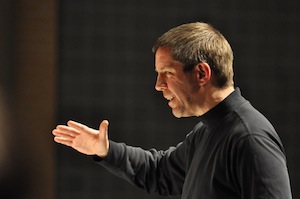Being a teacher can easily seem incompatible with being an artist. If you’re considering music education as a career, here are some thoughts and tips to help you live more abundantly in both worlds.
by Robert Franzblau
The “Education” Part of Music Education
Expect more emphasis on science than on feeling. For better or worse, we live in an age of “accountability,” which has become synonymous with “testing.”
Parents, taxpayers, and school officials want evidence that students are learning. Teachers are trained how to set objective goals for their students and measure their progress toward these goals. Terms like “student learning objectives,” “standards,” “benchmarks,” “grade span expectations,” and “assessment of student learning outcomes” all refer to this strategy of measuring progress.
As a music educator, you’ll be required to define what your students should learn and to document their progress regularly. Experienced teachers specify the skills and knowledge they expect of their students: for example, play or sing their ensemble music at a given speed and accuracy.
Music education majors spend a lot of time studying how to specify learning in observable, measurable behaviors (i.e., behavioral objectives or outcomes). They also spend a lot of time learning how to construct and use rubrics to assess how well students are meeting these objectives.
The Numbers Game
Some music education students, those who already see themselves as artists, often feel their classes are dominated by putting numbers on the very thing that was so attractive because of its ABSENCE of “correct” answers – that is, music! Like most of us, they chose music education because they wanted to share music’s powerful effect with others, not because they wanted to try and measure it. I’ve seen fine young musicians, many of whom I thought would make inspiring music teachers, get so turned off that they abandon music education as a career.
On the other extreme, some music education students become so caught up with the techniques of measurement and evaluation that they lose sight of the art of music. Developing their “teaching skills” becomes more important than developing insight into music, and their teaching lacks depth. They make a critical error: they forget that in education, the things that GET measured are usually just the things that are easiest to measure.
Mastery of scales, knowledge of musical terminology, and accurate technique all have “correct answers.” They are the tools your students will need to create something beautiful. But they are a means, not an end. Don’t confuse the sculptor’s hammer and chisel with the finished sculpture.
Staying on Track
Music education majors need balance. Make time in your life for those things that drew you to music in the first place, qualities which are beyond behavioral objectives and rubrics.
- Feed your inner artist by listening to great music played well, especially live performances.
- Listen to recordings of extraordinary music that you and your students will never play, either because they’re too difficult or they’re outside your area of focus or familiarity. For example, instrumentalists should listen to great singers.
- Read inspiring books that AREN’T required for your classes.
- Hang out with students in majors other than music. Read poetry, and read it out loud.
- Spend some time alone each day, and get outside to let nature’s beauty inspire you.
- Study scores to unlock their secrets.
- Master your instrument, which is really mastering your body and your mind.
Remembering Your Purpose
The performance of music requires great physical coordination. Studying music demands cognitive reasoning at a high level. But music’s greatest value is its ability to embody and express that which is beyond actions and words.
Being a teacher in today’s schools has its share of challenges. Your mission is to balance the tasks of systematic student assessment with the joys of sharing music’s magic with your students.
 Dr. Robert Franzblau conducts the wind ensemble and teaches music education at Rhode Island College. He is the author of So You Want to Be a Music Major: A Guide for High School Students, Their Parents, Guidance Counselors, and Music Teachers.
Dr. Robert Franzblau conducts the wind ensemble and teaches music education at Rhode Island College. He is the author of So You Want to Be a Music Major: A Guide for High School Students, Their Parents, Guidance Counselors, and Music Teachers.
Photo Credit: Play On Philly


Adeyemi
I’m privileged to teach primary school students music and recorder musical instrument.
What are fine the the I can do to promote music in that school?
MajoringInMusic
Music organizations and associations are wonderful resources for helping teachers answer this kind of question. We suggest you start by using the internet to learn about the work of the National Association for Music Education (NAfME), Association of Popular Music Education (APME), and Music Teachers National Association (MTNA) all in the US; the National Association of Music Teaching Professional (MMA) in the UK; the European Music Educators Association (EMEA); and the International Society for Music Education.